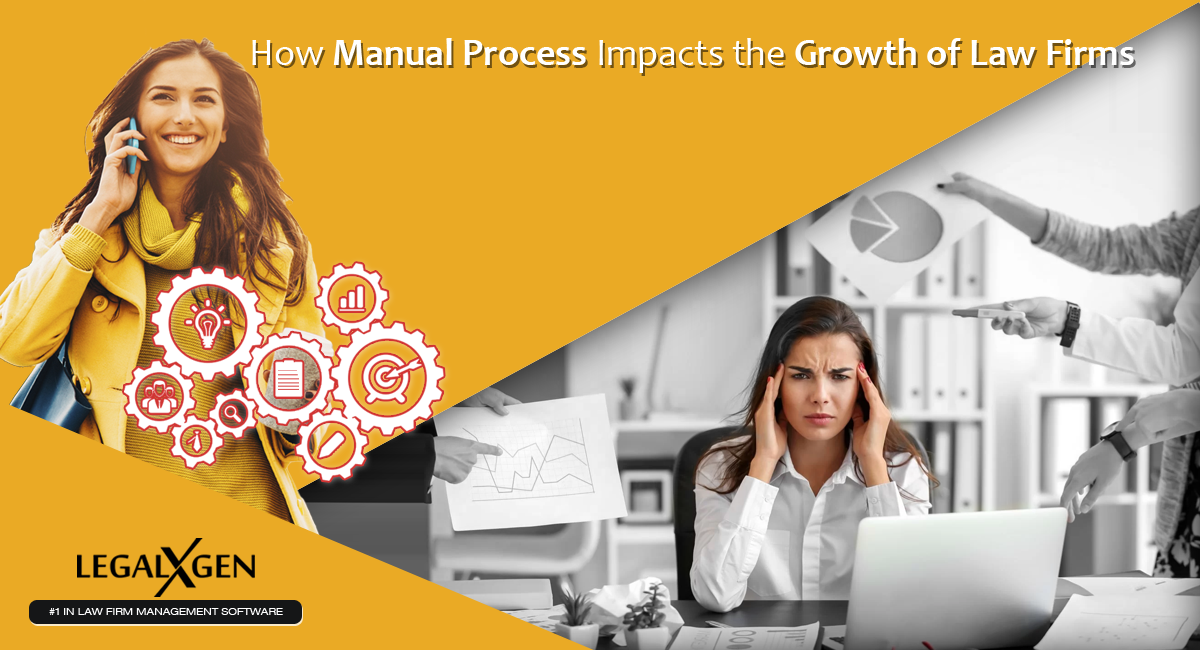

Are you still using manual processes for legal research, document generation, and workflow in your law firm?
Let me make it crystal clear, YOU ARE LAGGING.
According to a recent McKinsey Global Institute study, at least 23% of a lawyer’s job can be automated through the usage of existing solutions and applications.
These technologies assist law firms and lawyers become more efficient by automating repetitive and labour-intensive operations, allowing them to focus on providing legal advice and other important services.
This article looks at some of the most recent developments in the field of legal task automation and explains How Manual Process Impacts the Growth of Law Firms??
- Workflow Management
The term ‘workflow’ refers to a series of tasks that are part of a bigger project, and it is sometimes used interchangeably with the term ‘business process.’
For example, it could be the series of tasks done at any law firm when a new matter is started:
- Conflict Check
- Engagement Letter
- Client/ Matter Creation
- Resource Assignment
- Notification/ Collaboration
- Approvals
Implementing workflow software can automate the above steps (processes) for law firms. This enables lawyers, associates, and paralegals to stay focused on their work, not the admin stuff.
Automation can eliminate many day-to-day operations with more accuracy and speed.
The following are some of the most common tasks, where workflow/automation could make the lawyers more productive:
- Collaboration
- Follow-ups
- Document Assembly
- Approvals
- Reports/ Analytics.
- Time Tracking
Time tracking is the process by which firms keep track of hourly employees’ working hours and guarantee that they are properly compensated for their time.
Keeping track of billable hours and expenses is another one of the most time-consuming tasks, which many lawyers put off until the last minute. Lawyers must devote a significant amount of time and attention to effectively updating their time-keeping records, and this important activity is frequently overlooked in preference of undertaking legal work.
Law firms have entered a bright new world of intensifying competition, higher client expectations, and innovative technologies. You cannot have a second thought if I say moving from human to machine improves productivity, lowers costs, and minimises errors, while freeing up human resources for more interesting tasks.
In a nutshell, the following are the benefits of having an automated time tracking system at your law firm:- Time Management
- Promotes Accuracy
- Billing (Firm ensures the hard work done by the team is billed)
- Client Billing
Aderant’s Marie Burgess notes, “lawyers work on multiple matters often for multiple clients on any given day.
Manual billing methods become tiresome and time-consuming as the number of recurring clients grows. Manual errors make the procedures extremely vulnerable to inaccuracy. As a subscription-based business grows, manual invoicing, payment, and revenue recognition systems become practically difficult to maintain.
An automated billing system is a form of software that handles all aspects of the billing process. It can produce invoices, collect payments, and handle approvals and provisioning with very minimal manual input.
Manual billing systems are inefficient and prevent you from growing your subscription business. Automation not only streamlines your invoicing process, but it also reduces billing errors and allows you to gain valuable business insights that can be used to help you grow.
A few of the most prominent benefits of having automation in client billing in any legal firm are:- Improves accuracy
- Saves time
- Provides clearer invoices
- Document Management
The storing and handling of legal papers is referred to as legal document management. Every day, lawyers deal with a large number of documents and files, including contracts, licenses, and letters, as well as emails, notices, and reports. As a result, they require access to systems that allow them to not only store but also track, manage, and search content.
Document management should not be confused with document storage, which is just the saving and organising of documents in folders on a local or networked file server. Document management includes a good part of legal business.
A few of the essential features that make document management one of the most essential components of the legal business are:- Allow users to record metadata about each document
- Allows version control functionality
- Allows native compatibility.
Lawyers and legal companies can greatly increase the quality and accuracy of their work by automating their manual processes. Furthermore, law companies that are more efficient are more appealing to clients. As a result, legal technology not only assists law firms in lowering overhead costs and increasing productivity, but also allows them to remain competitive and retain clients.
Fortunately, LegalxGen’s all-in-one legal business solution combines all these capabilities for a seamless experience.
Legalxgen would be delighted to assist your firm with automation adoption and be a part of your success story. Now is your chance to try a FREE DEMO!!

Market Research Analyst with a Master’s in Marketing and Analytical Experience.
 English
English French
French German
German